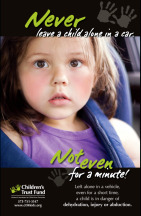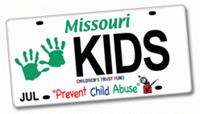 The Missouri Department of Transportation (MODOT) and the Children’s Trust Fund have joined forces to remind parents and caregivers that children should never be left alone in a car – not even for a minute. [News Release – Public Service Announcement]
The Missouri Department of Transportation (MODOT) and the Children’s Trust Fund have joined forces to remind parents and caregivers that children should never be left alone in a car – not even for a minute. [News Release – Public Service Announcement]
MODOT has placed posters supporting CTF’s Not Even for a Minute public-awareness campaign in its 28 rest area locations in Missouri. The campaign encourages parents and caregivers not to leave children alone in or around vehicles. Left alone in a vehicle, even for a short time, a child is in danger of dehydration, injury, abduction or death. This important message will also scroll across approximately 66 electronic message boards along Interstates 70, 44, 55, 29 and 35 and on U.S. Route 60, through the end of August.
“We all know how hot Missouri summers can be, but regardless of the temperature it is never a good idea to leave children alone in and around vehicles,” said Kirk Schreiber, CTF executive director. “The inside of a car can heat up to extreme and dangerous temperatures very quickly and result in tragedy for children within minutes. CTF is very appreciative of MODOT helping us reach more people with this important safety message.”
According to Safe Kids USA from 1998 to 2009, 443 children died from heat stroke while unattended in a car, and 88 percent of children who die from heat stroke are ages three and younger. On days when the temperature exceeds 86˚F, the internal temperature of a car can quickly reach upwards of 130˚F.
“Keeping Missourians safe is our top priority, and we are pleased to help the Children’s Trust Fund remind folks never to leave children alone in or around cars,” said MODOT Interim Director Kevin Keith. “We estimate almost 20 million people visit our rest areas every year so they are certainly prime locations to convey this important message.”
“We’re reaching them in the vehicles they’re traveling in,” added MoDOT Community Relations Manager Sally Oxenhandler. “A lot of travelers will probably stop at our rest areas along the way, and those are prime locations, the message boards and the rest areas, where we can get out this important message not to leave children unattended in vehicles.” [AUDIO]
It’s a car accident you can prevent:
- Never leave children unattended in or around an automobile.
- Teach your children the dangers of a car and let them know it is not a toy or playground.
- Keep car doors and trunks locked so children cannot play in them. Keep keys and remote entry keyfobs out of children’s reach. Kids may be able to use a remote entry keyfob to unlock a car from inside a house leaving an unlocked car for others to enter.
- Make your child as visible as possible. Place rear-facing car seats in the middle of the back seat.
- Establish a routine of checking the back seat every time you exit the car to ensure no one is left behind. Do not overlook sleeping infants.
- Try to plan ahead when you have errands. Run errands when your spouse, trusted neighbor or friend can watch your child.
- Remember to use the drive-through convenience provided by banks, dry cleaners, pharmacies, restaurants and other businesses.
- Use your debit or credit card at the gas pump.
• Place your cell phone, PDA, purse, briefcase, gym bag, or lunch bag on the floor in front of your child’s car seat to give you an additional reason to check the back seat. Be sure it is something that you always carry with you. - Set your cell phone or your daily calendar in Outlook at the same time each day to remind you that the baby should have been dropped off at daycare. Many tragedies have happened as the caregiver drove on to work instead of stopping at daycare.
- Keep a special toy in your child’s empty car seat when the child is not with you. Bring that toy to the front seat when the child is in the car seat to serve as a constant, visible reminder of your child’s presence in the car.
- Call 911 if you see children unattended in a car. The first responders tell us they would rather have those calls so they can determine if the child is at risk than have the emergency call later when a child is in deep trouble.
- When a child is missing, check vehicles and trunks immediately.




